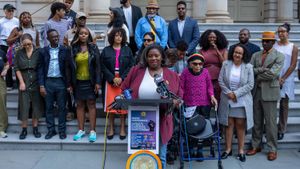A seminar titled "Common River Water and the India Question: What is the Politics of Resolution?" delved deeply into the long-standing dispute over river waters between India and Bangladesh, which has been unresolved for over three decades. Hosted at the Professor Muzaffar Ahmed Chowdhury Auditorium of Dhaka University, the event gathered experts, academics, and political figures to dissect the multifaceted issues surrounding the dispute and explore viable resolutions.
One of the standout voices at the seminar was BNP standing committee member Amir Khasru Mahmud Chowdhury. He pointed out the political and security concerns interweaving India's relations with Bangladesh and stressed the urgent need for mutual respect and non-interference. According to Chowdhury, it is imperative for Bangladesh to realign its approach to international water law. He echoed the sentiment for reviving the River Basin Commission, which he believes will help safeguard the country’s rights to its river resources.
Former caretaker government advisor Dr. Hossain Zillur Rahman took the discourse a step forward by critiquing what he perceives as the tendency to prioritize Indian demands over Bangladeshi needs. He articulated the necessity of balancing relationships with all neighboring countries, ensuring Bangladesh’s interests are prominently represented. “Negotiations should highlight Bangladesh’s current and future requirements,” Rahman insisted. He believes attaining fairness within water-sharing agreements is key to reaching lasting solutions and avoiding future conflicts.
Sheikh Rokon, secretary general of Riverine Peoples, traced the historical origins of the water-sharing conflicts. He emphasized how arrangements concerning water distribution were overlooked during the 1947 partition of the Indian subcontinent. Ethiopia hasn’t established satisfactory permanent solutions for the distribution of major rivers like the Ganges and Teesta, leading to enduring disputes. Rokon urged comprehensive agreements concerning the Ganges, Meghna, and Brahmaputra rivers, arguing the impracticality of negotiating water rights for the country’s 123 transboundary rivers individually.”
Mohammad Ejaz, chairman of the River and Delta Research Center, expressed concerns over India “weaponizing” water flows to exert pressure on Bangladesh. He elaborated on how Bangladesh endures seasonal flooding during monsoons and drought-like conditions during dry seasons, worsening its reliance on India for water. Referencing international river treaties as models for cooperative negotiation, Ejaz pointed to the Ganges treaty as a precedent for progress and urged similar approaches.
The seminar, chaired by Manjur Moin of Unity for Bangladesh, featured speeches from various actors, including Abdullah Kafi Ratan of the Communist Party of Bangladesh, writer Altaf Parvez, researcher Afifa Razzak Muna, and Dipti Dutta from Dhaka University’s Department of South Asian Studies. The discussions encompassed geographical, historical, and political narratives, showcasing the diverse dimensions of the river water dispute.
Solutions to unresolved transboundary river issues between Bangladesh and India hinge on collaborative discussions with neighboring countries, such as Nepal, Bhutan, and China, as emphasized by politicians and researchers at another event on the same day. During this discussion, organized by the civic group Unity for Bangladesh at the Dhaka University Auditorium, speakers argued for including wider South Asian representation to shape the river-sharing dialogue.
Once again, Amir Khasru Mahmud Chowdhury highlighted the ineffectiveness of solely bilateral negotiations for transboundary water sharing, asserting the need for multilateral discussions involving the additional South Asian countries. He stressed the importance of redesigning Bangladesh-India relations based on mutual respect, shared interests, and non-interference.
Writer and researcher Altaf Parvez also addressed the importance of reforming Bangladesh’s foreign policy to renew the South Asian Association for Regional Cooperation. He asserted this approach could resolve not only water-sharing disputes but also prominent economic and security challenges within the region.
Meanwhile, Mohammad Ejaz, from the River and Delta Research Center, forewarned of the consequences of infrastructural developments on the upstream side of the rivers. He sounded alarms about the construction of 168 hydropower infrastructures observed on 54 officially recognized transboundary rivers shared between Bangladesh and India. Ejaz pointed out how unilateral actions like these could destabilize the region’s security.
Collaboration and joint policymaking among Bangladesh and its neighbors could be the linchpin for solutions to these prominent water-sharing challenges. Sheikh Rokon reiterated his earlier stance, emphasizing the historical unfairness stemming from national boundary demarcations during the 1947 partition as the root cause of today’s water distribution problems.
Ably chaired by Unity for Bangladesh spokesperson Manzur Moin, the discussion featured inputs from various stakeholders, including former caretaker government advisor Hossain Zillur Rahman, Dhaka University’s Dipti Rani Datta, and Communist Party member Abdullah Al Kafi Ratan. The diverse bulwark of opinions enriched the discussion and laid the groundwork for potential pathways toward resolution.



